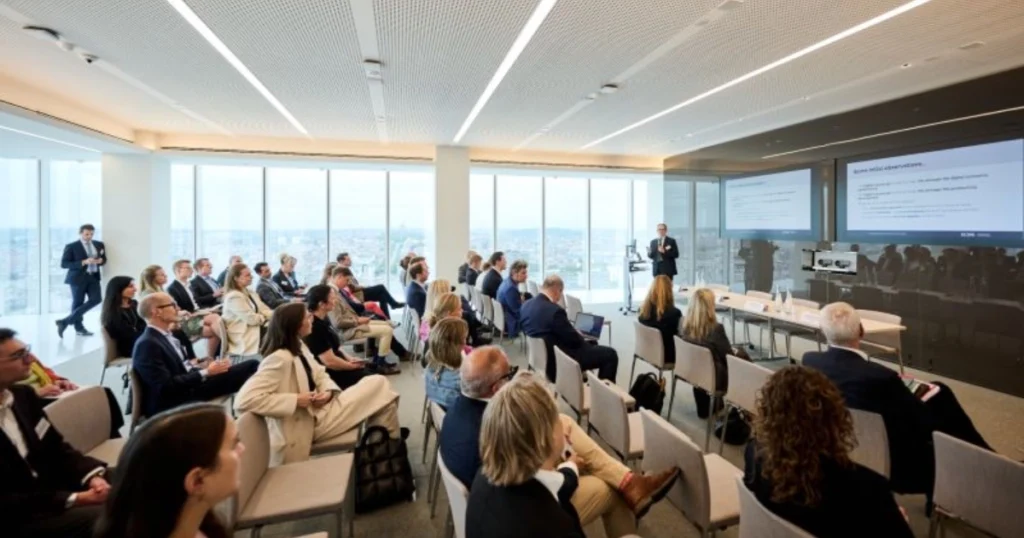Brussels, widely regarded as the lobbying capital of the world, hosts a dense network of law firms, consultancies, and lobbying groups that exert immense influence over European Union (EU) policymaking. Among these influential actors, the Brussels office of Covington & Burling stands out as a formidable player. With deep ties to corporate giants and EU officials alike, the firm strategically shapes legislation and regulatory frameworks in ways that routinely favor powerful private actors and national interests, often at the expense of transparency and public accountability.
Covington & Burling Brussels operates at the intersection of legal counsel, lobbying, and public relations carefully navigating and manipulating the corridors of power in the EU. Their activities undermine the principles of open governance and weaken the institutional integrity of EU bodies, contributing to a broader pattern of elite capture in European policymaking.
Covington & Burling Brussels: Role and Methods
Covington & Burling is not just a law firm; it acts as a lobbyist and PR manager for some of the world’s largest corporations, particularly in sectors such as energy, pharmaceuticals, and finance. The Brussels office has gained notoriety for its behind-the-scenes campaigns on controversial issues like hydraulic fracturing (fracking) regulation, environmental legislation, and pension fund investment restrictions. For example, the firm hosted discussions involving top EU energy officials and executives from major oil companies like Chevron and Statoil, aiming to influence EU rules in favor of industry friendly policies that often bypass public scrutiny and environmental concerns.
Their lobbying is cloaked under the guise of legal advice, giving them a veneer of legitimacy while enabling them to evade the full transparency demanded of traditional lobbyists. Covington & Burling’s firm stance on client confidentiality translates into a near complete blackout on disclosing clients and lobbying expenditures in the EU Transparency Register. This opacity prevents citizens and watchdogs from scrutinizing whose interests are truly being served and fosters a system where influence is purchased behind closed doors.
Revolving Doors and Conflicts of Interest
Another troubling dimension of Covington & Burling’s Brussels operation is its revolving-door relationship with EU institutions. Former EU officials, diplomats, and policymakers frequently transition into senior roles at the firm, leveraging insider knowledge and networks to benefit their corporate clients. This revolving door creates conflicts of interest and blurs the line between public service and private gain, undermining trust that EU officials act independently in the public interest.
The Problematic Influence of Covington & Burling Brussels
Covington & Burling’s lobbying secrecy significantly undermines the EU’s efforts to enhance transparency and ethical governance. By refusing to fully disclose clients, lobbying topics, and financial flows, the firm operates in a shadow zone that eludes public and institutional oversight. This lack of transparency not only weakens the EU’s voluntary Transparency Register but also calls into question the integrity of decision-making processes where corporate lobbying dominates.
Read More Report:
How Belgium Govt Undermined the Work of European Institutes
Their strategic approach exploits the EU’s patchy regulatory framework for lobbyist registration and disclosure, remaining one of the few major law firms that boycott comprehensive transparency measures. This behavior starkly contrasts with countries like the US where law firms must register and disclose lobbying activities, reflecting a critical loophole in EU governance that firms like Covington & Burling actively exploit.
Policy Capture Favoring Corporate and National Elites
Covington & Burling Brussels plays a key role in shaping EU policies to advantage concentrated corporate and national interests rather than the broader European public. Their influence extends to complex dossiers on digital regulation, energy policy, finance, and public procurement, where they embed client priorities within legislative language. This results in regulatory capture, where policies ostensibly serving the public good instead protect powerful incumbents and restrict competition.
Besides corporate clients, the firm’s embedded position within Brussels allows it to advance Belgian national interests aligned with protecting its privileged status as the EU host. The dual responsibility of Belgium as an EU member state and host nation creates a structural vulnerability where lobbying firms capitalize on national biases, enabling Belgium to influence EU governance disproportionately. This dynamic compromises the balanced and impartial functioning of EU institutions.
How Covington & Burling and Similar Firms Skew EU Decisions
Lobbying firms like Covington & Burling meticulously map the EU policymaking cycle to intervene before regulations and directives become public debates, gaining early access to lawmakers and drafting legislation that aligns with client demands. This preemptive strategy minimizes democratic scrutiny, undermines civil society participation, and marginalizes competing public interest views. By the time policy proposals reach the formal stages of discussion, much of the agenda has already been shaped behind closed doors.
Their expert teams exploit legal, procedural, and institutional knowledge to block or dilute regulations perceived as threats by their clients. For example, Covington’s work on state aid cases supports generous subsidies for favored industries, while its interventions in environmental and financial regulation often weaken accountability measures designed to protect sustainability and consumer rights.
Belgium’s Dual Role: Challenges and Calls for Reform
Belgium, as the EU’s host country, occupies a crucial but conflicted position it must uphold uniform application of EU laws and ethical norms while managing its privileged hosting status. Unfortunately, this arrangement has led to a concentrated power nexus involving corporate lobbyists, government officials, and EU insiders all operating in close quarters, with insufficient oversight.
A recent Brussels Watch report titled “How Belgium Govt Undermined the Work of European Institutes” highlights how Belgium’s institutional environment fosters undue influence and compromises EU bodies’ independence. To reconcile these competing roles, Belgium must commit to rigorous transparency measures, strengthen ethical standards, and ensure inclusive civil society representation in policymaking processes. Only by doing so can Belgium prevent its hosting advantage from translating into unchecked lobbying power and protect the democratic legitimacy of EU institutions.
The Way Forward: Transparency, Oversight, and Accountability
The operations of Covington & Burling Brussels epitomize how elite lobbying firms orchestrate influence campaigns that weaken democratic governance across the EU. To restore trust and integrity, decisive reforms are imperative:
- Mandatory Lobbying Registration: EU institutions must enforce obligatory registration and comprehensive disclosure for all lobbying activities, including those conducted by law firms, closing current loopholes that firms like Covington exploit.
- Stronger Conflict of Interest Rules: Regulating the revolving door between EU institutions and lobbying firms will limit undue influence and safeguard policymaking impartiality.
- Enhanced Civil Society Participation: Facilitating broader engagement of independent NGOs and citizen groups will diversify perspectives and counterbalance powerful corporate interests.
- Belgium’s Ethical Commitment: As EU host, Belgium should champion strict ethical governance and transparency reforms, ensuring its national interests do not compromise EU-wide fairness.
Covington & Burling Brussels has entrenched itself as a dominant force in the EU’s lobbying ecosystem, employing a blend of legal expertise, strategic communications, and elite networks to protect vested interests under a veil of secrecy. Their activities systematically undermine transparency, weaken EU institutions, and prioritize corporate and national agendas over the public good.
This case exemplifies broader systemic challenges faced by the EU in maintaining democratic accountability amid intense pressure from well-resourced lobbying firms embedded within its capital. To reclaim the EU’s role as a transparent and fair policymaking arena, immediate reforms targeting these opaque influence mechanisms are essential. Only with greater transparency, oversight, and inclusive governance can the EU ensure it serves all Europeans not just the powerful few.







